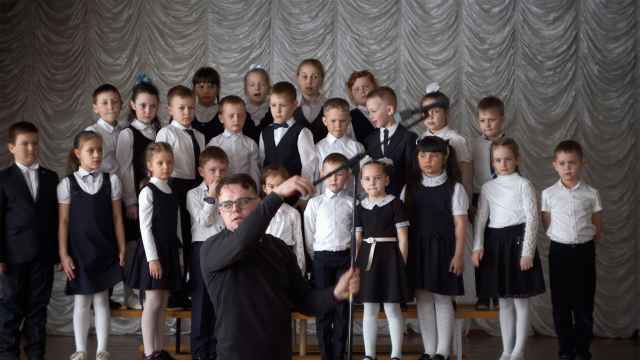Whenever Russian and European politicians meet, the question of human rights inevitably arises. And every time, the Europeans — sometimes tactfully and sometimes not so — speak about the disturbing situation in Russia. For their part, the Russian officials respond — sometimes in a friendly manner and sometimes with great irritation — that they are working hard on the issue. The Europeans are increasingly losing patience, describing Russia as an obstinate student who refuses to learn from their example, denies all wrongdoing and has the temerity to hurl accusations at Europe. As a result, the underlying causes of the problem are not addressed.
To understand the source of the misunderstanding, it is necessary to examine the language employed. After all, language is a mirror that reflects the social reality in which it develops. What linguistic differences exist between the two sides?
Europeans tend to speak of human rights in a legal context. That is not to say they use only dry legal terms or refer exclusively to various conventions, treaties and laws, but their arguments and the logic of their discourse are based on legal principles and are rooted in the law itself. Although the concept of human rights has a philosophical basis, it remained almost exclusively the domain of lawyers until the 1980s. That is why the language Europeans employ when speaking of human rights is characterized by order, consistency and clearly defined terminology. It does not concern itself with rights and values, morality and immorality, good and evil or trust and distrust. Instead, it focuses on responsibility, justice, common interests, freedom, effectiveness and results.
Whenever Europe presents Russia with its latest concerns regarding human rights, it always follows certain rules. According to the European legal, political and ideological tradition, rights are rational, inalienable and self-evident by their very nature, and therefore Europeans employ a rational and clear language when discussing human rights.
But in Russia, the situation is much different. Russian politicians speak of human rights as something unconnected to the law. That is why, when human rights ombudsman Vladimir Lukin spoke with President Vladimir Putin on Dec. 6, he described the uprising at a Chelyabinsk penal colony as an "outburst of serious, evil intentions by prison inmates." That is a pure value judgment. Where is the reference to human rights? Which rights were violated, how and by whom?
President Putin's own references to human rights are even more heavily weighted with connotations of morality and ethical considerations. A simple analysis of Putin's public statements on human rights reveals that he most often uses the words "right, correct, good, bad, honest, dishonest, trustworthy, moral, honest." In a recent address to the Federal Assembly, Putin defined a "responsible Russian citizen" as a "morally harmonious person." In this way, Putin tries to bind the concept of citizenship to morality.
Putin also explained that the basic requirement for the country's development is the "moral authority of the state." In this context, the law becomes an instrument for protecting morality. That is why the Kremlin speaks of human rights using language that is emotional and full of subjective judgements. It also explains why it so rarely cites human rights conventions and treaties. Russians do not gauge the observance of human rights strictly in terms of following the letter of the law but in "moral" terms of upholding what is "good" versus sanctioning what is "bad," intentionally avoiding legal terminology. This is because a concrete law clearly defines what constitutes a crime, while a more abstract moral standard leaves wide room for an official interpretation of what is "good" and what is "bad."
Consider a simple example: a joint press conference by Vladimir Putin and Luxemburgian Prime Minister Jean-Claude Juncker on Sept. 25. In response to a reporter's question regarding human rights, Juncker said: "Yes, I have discussed the human rights questions with the Russian president during our personal meetings. … To play an effective part in helping to resolve these problems, I am happy to discuss such issues but not at news conferences."
Juncker's focus was on being effective in dealing with the issue. In response, Putin said: "Mr. Juncker and I have known each other for a long time now, and I think he would agree that we have good and friendly relations. He is frank in sharing with me his point of view on all the various issues, including human rights issues, and we discuss things openly and freely, without any limitations." Thus, Putin emphasized the person and the nature of their dialogue, but not the problem itself.
In stating their positions, Europeans use such words as "I think," "I believe," and "I am certain." Russians more frequently say, "I feel that" or "I have a sense that." All of the words that are uttered without conscious intention — trust, morality, honesty, openness, good and bad — when considered closely, form a symbolic language that someone who speaks from a more law-based frame of reference has difficulty understanding.
Like two people who each speak a language unfamiliar to the other and who could hardly be expected to reach agreement on anything, the European Union and Russia will not reach a common understanding on the issue of human rights. They can do so only when they begin speaking the same language, one in which sound legal arguments take precedence over debatable and subjective notions of morality and ethics.
Olesya Zakharova is a visiting fellow of the Institute for Human Scienсes in Vienna.
A Message from The Moscow Times:
Dear readers,
We are facing unprecedented challenges. Russia's Prosecutor General's Office has designated The Moscow Times as an "undesirable" organization, criminalizing our work and putting our staff at risk of prosecution. This follows our earlier unjust labeling as a "foreign agent."
These actions are direct attempts to silence independent journalism in Russia. The authorities claim our work "discredits the decisions of the Russian leadership." We see things differently: we strive to provide accurate, unbiased reporting on Russia.
We, the journalists of The Moscow Times, refuse to be silenced. But to continue our work, we need your help.
Your support, no matter how small, makes a world of difference. If you can, please support us monthly starting from just $2. It's quick to set up, and every contribution makes a significant impact.
By supporting The Moscow Times, you're defending open, independent journalism in the face of repression. Thank you for standing with us.
Remind me later.






